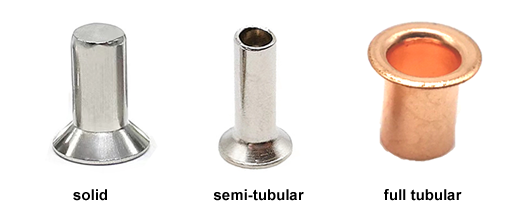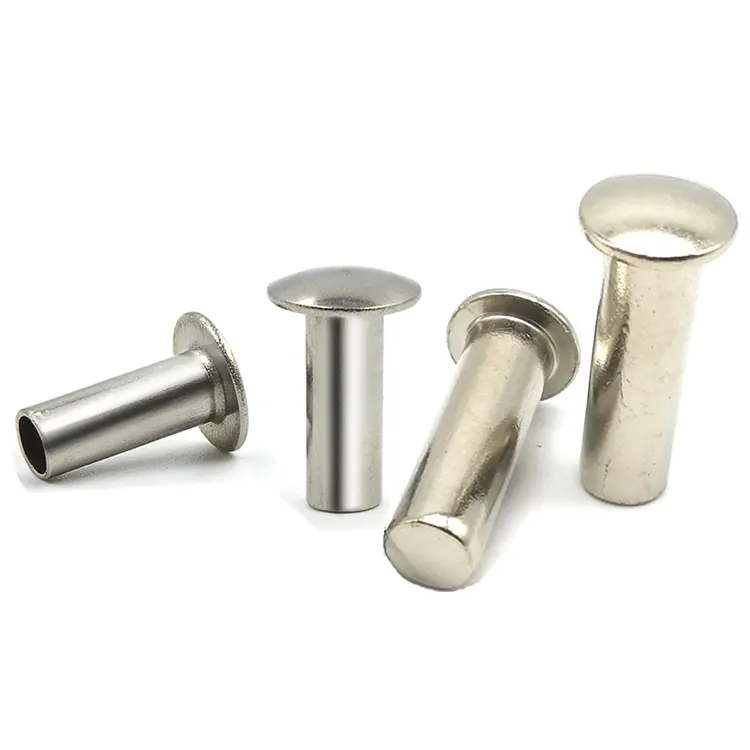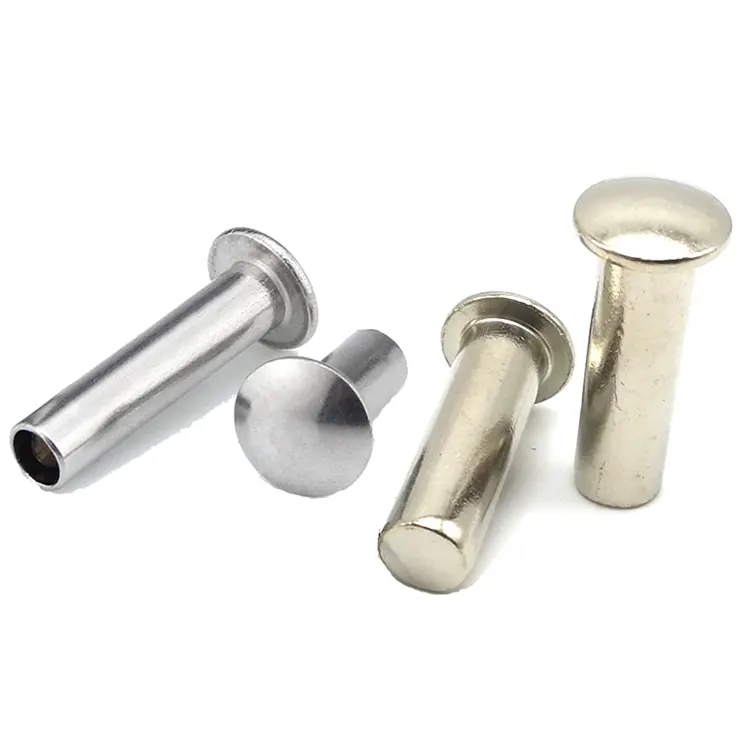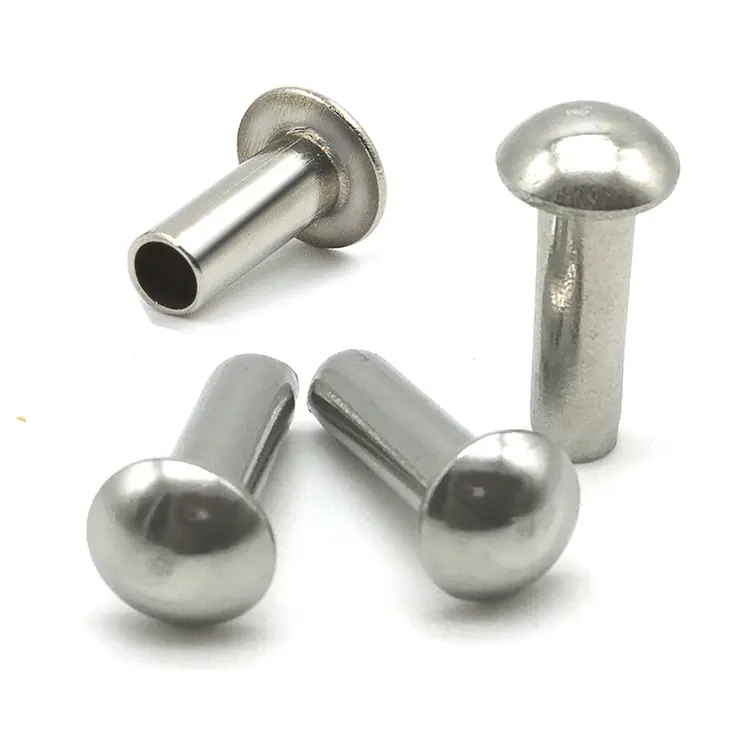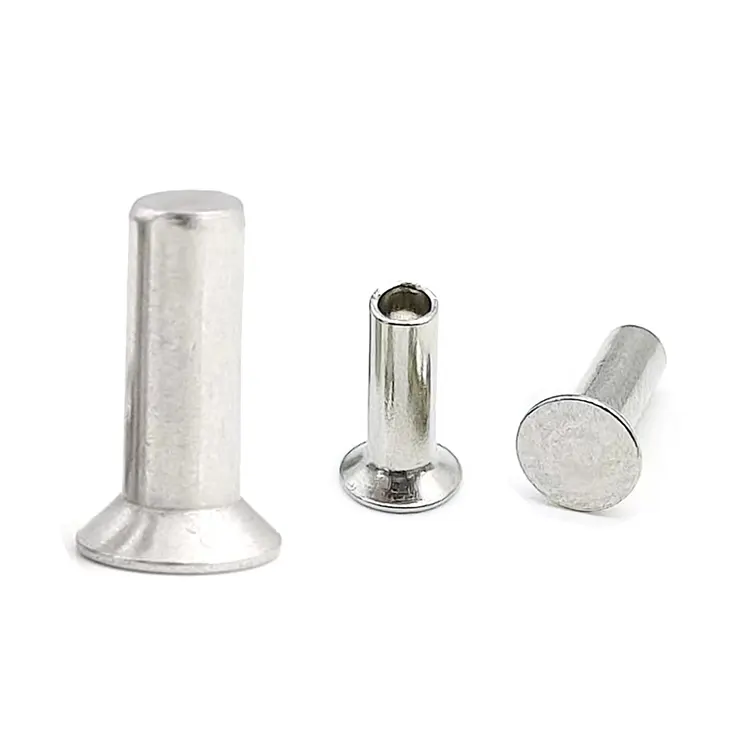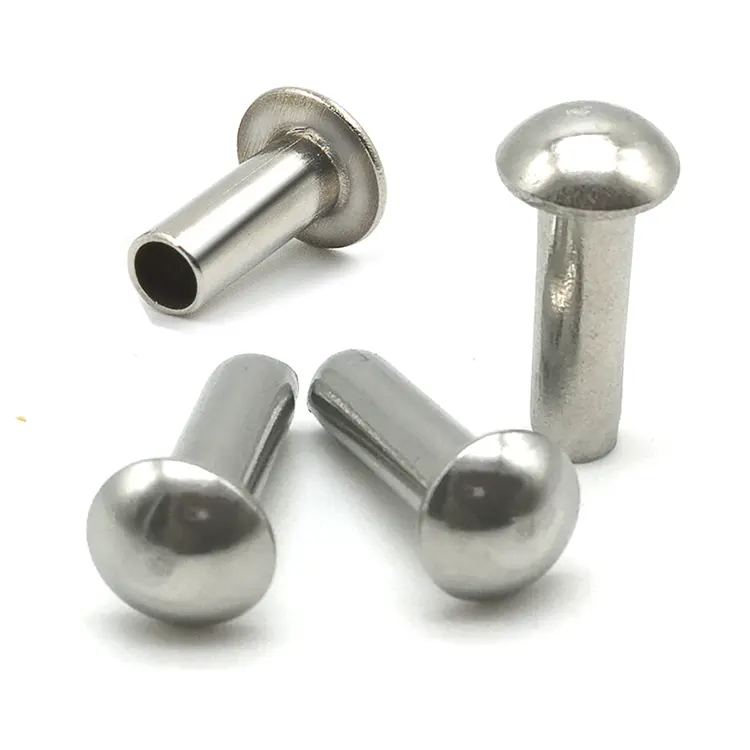Rivets
As one of professional manufacturer in China, Notin would like to provide you Rivets. And we will offer you the best after-sale service and timely delivery.
What is a rivet?
A rivet is a permanent mechanical fastener used to join two or more materials. Rivets work by inserting a metal pin into an aligned hole and deforming the end, creating a strong, secure, and durable connection. Unlike temporary fasteners like screws, rivets do not rely on threads, but instead form a permanent connection, making them ideal for applications requiring high strength, durability, and vibration resistance.
Classification of Rivets
Rivets are typically categorized by head shape, degree of hollowness, or material.
Based on head shape, rivets can be classified as flat head rivets, round head rivets, countersunk head rivets, mushroom head rivets, universal head rivets, truss head rivets, etc.

Based on degree of hollowness, rivets can be classified as solid rivets, semi-tubular rivets, or full tubular rivets.
Based on material, rivets can be classified as brass rivets, stainless steel rivets, steel rivets, aluminum rivets, copper rivets, etc.
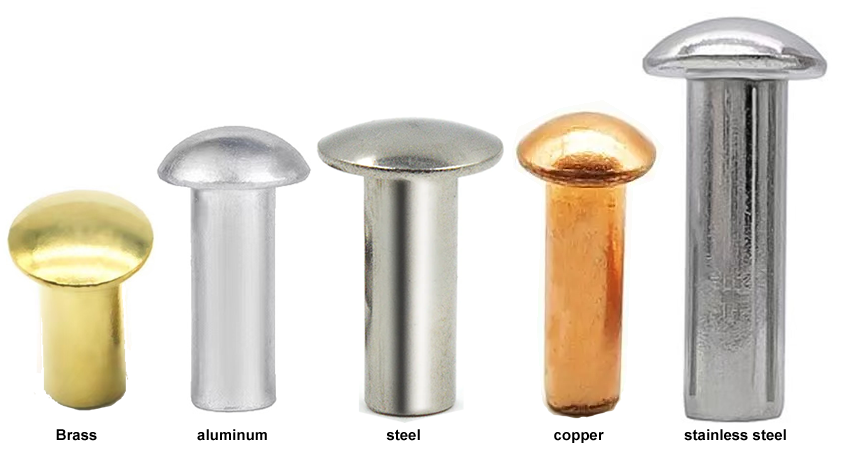
What surface finishes are available for rivets?
Rivet surfaces are typically treated with rust-proofing treatments, primarily electroplating, including zinc plating, nickel plating, chrome plating, tin plating, gold plating, and silver plating. Electroplating is a common rust-proofing method for rivets. It applies a layer of plating to the rivet surface through physical or chemical methods. The plating effectively prevents corrosion and rust, while also providing a certain aesthetic effect.
Another special surface treatment method is head coating. Head coating is performed after the rivet is electroplated. This allows for a variety of colors on the rivet head, achieving an aesthetically pleasing finish.
Aluminum rivets cannot be electroplated, but they can be anodized. Anodizing also allows for a variety of color options, but the unit price is higher than electroplating.
Rust-proofing the rivet surface is crucial, effectively extending the rivet's service life and ensuring a secure connection. Different rust-proofing methods are suitable for different environments and applications, so the choice should be tailored to the specific situation.
- View as
Steel Rivets
Carbon steel rivets are a common mechanical fastener used in a wide variety of industrial and everyday products. Their primary function is to securely connect two or more components together, creating a stable structure. Carbon steel rivets are popular due to their strength, durability, and cost-effectiveness. Nuote Metals has been manufacturing carbon steel rivets for over a decade. Located in Dongguan, China, known as the "World's Factory," we welcome visitors from around the world to visit us.
Read MoreSend InquirySteel Pan Head Rivets
Steel pan head rivets are a common industrial fastener used in a wide range of applications, including automotive, aviation, and construction. Nuote Metals specializes in the production of steel pan head rivets, which are sold worldwide. We offer a wide range of rivets made of various materials, including brass, stainless steel, aluminum, and copper. We can also customize our products with various surface treatments, such as electroplating, pickling, and anodizing, to meet customer requirements.
Read MoreSend InquirySteel Mushroom Head Rivets
Steel mushroom head rivets, also known as domed head rivets, are widely used in industrial applications. Their unique mushroom head shape and steel construction provide a secure and reliable connection for a variety of structures. Nuote Metals is a specialist in steel mushroom head rivets. Our rivets are sold worldwide and have earned recognition from both domestic and international customers. We welcome your inquiries and the opportunity to serve you.
Read MoreSend InquirySteel Flat Head Rivets
Steel flat head rivets securely connect components through deformation or interference fit, ensuring they remain inseparable and suitable for applications subject to general loads. They can also be finished with nickel, white zinc, blue zinc, black zinc, colored zinc, copper, or chrome plating to suit various environments and aesthetic requirements. Nuote Metals specializes in the production of steel flat head rivets, shipping worldwide. Custom orders are also welcome.
Read MoreSend InquirySteel Countersunk Head Rivets
Steel countersunk head rivets are a commonly used fastener used to connect two or more workpieces. They are secured to the workpieces by hammering or mechanical force, creating a secure connection. Nuote Metals is a specialist in the production of steel countersunk head rivets, located in Dongguan, China, a city with a thriving industry. Our rivets feature a smooth, burr-free surface, flawless plating, and crack-free joints. We welcome inquiries and orders.
Read MoreSend InquiryStainless Steel Round Head Rivets
Round head rivets offer excellent corrosion resistance. This is especially true for 304 stainless steel round head rivets, which are made from 304 stainless steel, a material renowned for its excellent corrosion resistance, good workability, and aesthetically pleasing finish. 304 stainless steel resists attack from a wide range of chemicals, making it ideal for use in wet and corrosive environments. As a result, 304 stainless steel round head rivets offer a longer service life in outdoor or humid environments, are less prone to rust, and offer low maintenance costs.
Read MoreSend InquiryWhat are the advantages of rivets over other fasteners?
1. Ease of Installation
Rivets are fast to install, and even fully automated for high-volume applications, resulting in a simple and efficient operation process.
2. Connection Reliability
The riveting process is standardized, with strict quality control, resulting in highly stable connections. Visual inspection allows for quick verification of connection quality.
3. Vibration and Impact Resistance
Rivets connect through deformation or interference fit, providing strong clamping force and excellent vibration resistance, capable of withstanding vibration and shock.
4. Low Cost
Rivets are easy to install and can be fully automated, saving significant labor costs.
What are the advantages and disadvantages of rivets made of different materials?
Aluminum Rivets
Advantages: Lightweight, reduces overall product weight, low cost, suitable for general civilian applications.
Disadvantages: Low tensile and shear strength, unsuitable for high-strength workpieces, prone to electrochemical corrosion when in contact with metals such as stainless steel.
Stainless Steel Rivets
Advantages: Strong corrosion resistance, high hardness, suitable for high-strength workpieces (such as marine equipment)
Disadvantages: Higher cost, typically more expensive than aluminum rivets of the same specification.
Brass and Copper Rivets
Advantages: Excellent conductivity (such as connecting electronic components), good corrosion resistance.
Disadvantages: Higher cost, more difficult to process.
Steel Rivets
Advantages: High hardness, high connection reliability, and wide applicability.
Disadvantages: Compared to other materials, iron rivets are more prone to rusting.
What are the main applications of rivets?
Rivets have a wide range of uses, from small items like a pair of scissors to large items like airplanes and ships, as well as in high-precision medical applications.
Industrial Manufacturing
Rivets are used in a wide variety of industrial fields, wherever there is a need to connect two or more materials.
Electronics
Rivets secure heat sinks and chips, providing both vibration damping and noise reduction, and are widely used in the cooling systems of electronic products such as computers and mobile phones.
Automotive
Rivets are widely used to connect components of automobile bodies and chassis, such as doors and hoods. Their lightweight and corrosion-resistant properties make them an indispensable joining method in automotive manufacturing.
Aerospace
In aircraft manufacturing, rivets are used to connect different fuselage components, such as wings and tailplanes. Millions of rivets create high-strength, corrosion-resistant joints. Aluminum and titanium alloy rivets are often used to connect components of corresponding materials, ensuring stability in extreme environments.
Rivets are used everywhere. The above examples only represent a small number of their applications. We see rivets everywhere in our daily lives, such as on scissors, folding beds, and strollers etc. Rivets can be customized to different sizes and materials depending on the application.
Nuote Metals has specialized in the rivet industry for over a decade. Our factory is located in Dongguan, a city known as the "World Factory," a city with a developed industry and convenient transportation. This allows us to respond quickly when acquiring raw materials and supporting surface treatments, meeting our customers' needs for quick access to samples and bulk orders. We produce 10 million rivets daily and have molds of various specifications, allowing us to produce rivets as small as 0.8mm and as large as 10mm. We welcome your inquiries and visits.






